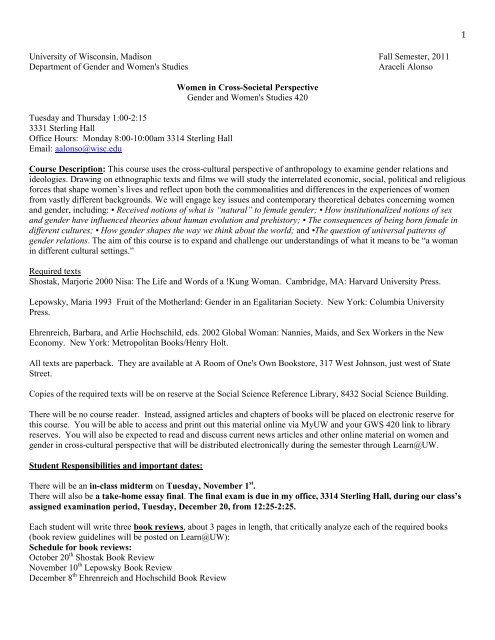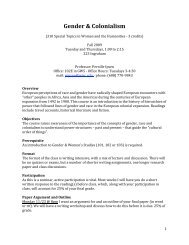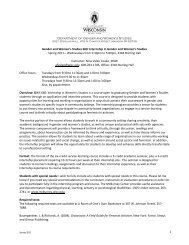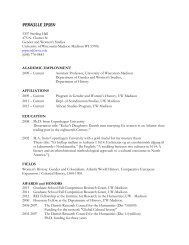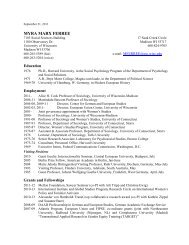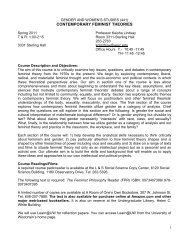Women in Cross-Societal Perspective - Women's Studies ...
Women in Cross-Societal Perspective - Women's Studies ...
Women in Cross-Societal Perspective - Women's Studies ...
You also want an ePaper? Increase the reach of your titles
YUMPU automatically turns print PDFs into web optimized ePapers that Google loves.
1<br />
University of Wiscons<strong>in</strong>, Madison Fall Semester, 2011<br />
Department of Gender and <strong>Women</strong>'s <strong>Studies</strong><br />
Araceli Alonso<br />
Tuesday and Thursday 1:00-2:15<br />
3331 Sterl<strong>in</strong>g Hall<br />
Office Hours: Monday 8:00-10:00am 3314 Sterl<strong>in</strong>g Hall<br />
Email: aalonso@wisc.edu<br />
<strong>Women</strong> <strong>in</strong> <strong>Cross</strong>-<strong>Societal</strong> <strong>Perspective</strong><br />
Gender and <strong>Women</strong>'s <strong>Studies</strong> 420<br />
Course Description: This course uses the cross-cultural perspective of anthropology to exam<strong>in</strong>e gender relations and<br />
ideologies. Draw<strong>in</strong>g on ethnographic texts and films we will study the <strong>in</strong>terrelated economic, social, political and religious<br />
forces that shape women’s lives and reflect upon both the commonalities and differences <strong>in</strong> the experiences of women<br />
from vastly different backgrounds. We will engage key issues and contemporary theoretical debates concern<strong>in</strong>g women<br />
and gender, <strong>in</strong>clud<strong>in</strong>g: • Received notions of what is “natural” to female gender; • How <strong>in</strong>stitutionalized notions of sex<br />
and gender have <strong>in</strong>fluenced theories about human evolution and prehistory; • The consequences of be<strong>in</strong>g born female <strong>in</strong><br />
different cultures; • How gender shapes the way we th<strong>in</strong>k about the world; and •The question of universal patterns of<br />
gender relations. The aim of this course is to expand and challenge our understand<strong>in</strong>gs of what it means to be “a woman<br />
<strong>in</strong> different cultural sett<strong>in</strong>gs.”<br />
Required texts<br />
Shostak, Marjorie 2000 Nisa: The Life and Words of a !Kung Woman. Cambridge, MA: Harvard University Press.<br />
Lepowsky, Maria 1993 Fruit of the Motherland: Gender <strong>in</strong> an Egalitarian Society. New York: Columbia University<br />
Press.<br />
Ehrenreich, Barbara, and Arlie Hochschild, eds. 2002 Global Woman: Nannies, Maids, and Sex Workers <strong>in</strong> the New<br />
Economy. New York: Metropolitan Books/Henry Holt.<br />
All texts are paperback. They are available at A Room of One's Own Bookstore, 317 West Johnson, just west of State<br />
Street.<br />
Copies of the required texts will be on reserve at the Social Science Reference Library, 8432 Social Science Build<strong>in</strong>g.<br />
There will be no course reader. Instead, assigned articles and chapters of books will be placed on electronic reserve for<br />
this course. You will be able to access and pr<strong>in</strong>t out this material onl<strong>in</strong>e via MyUW and your GWS 420 l<strong>in</strong>k to library<br />
reserves. You will also be expected to read and discuss current news articles and other onl<strong>in</strong>e material on women and<br />
gender <strong>in</strong> cross-cultural perspective that will be distributed electronically dur<strong>in</strong>g the semester through Learn@UW.<br />
Student Responsibilities and important dates:<br />
There will be an <strong>in</strong>-class midterm on Tuesday, November 1 st .<br />
There will also be a take-home essay f<strong>in</strong>al. The f<strong>in</strong>al exam is due <strong>in</strong> my office, 3314 Sterl<strong>in</strong>g Hall, dur<strong>in</strong>g our class’s<br />
assigned exam<strong>in</strong>ation period, Tuesday, December 20, from 12:25-2:25.<br />
Each student will write three book reviews, about 3 pages <strong>in</strong> length, that critically analyze each of the required books<br />
(book review guidel<strong>in</strong>es will be posted on Learn@UW):<br />
Schedule for book reviews:<br />
October 20 th Shostak Book Review<br />
November 10 th Lepowsky Book Review<br />
December 8 th Ehrenreich and Hochschild Book Review
Graduate students, and undergraduate students tak<strong>in</strong>g the class for honors credit, will also write a term paper,<br />
approximately 10-12 pages <strong>in</strong> length exclud<strong>in</strong>g bibliography, on a topic related to the study of women or gender <strong>in</strong><br />
cultural or cross-cultural perspective. The topic must be approved <strong>in</strong> advance by the <strong>in</strong>structor after you have submitted a<br />
one-page outl<strong>in</strong>e or summary plus work<strong>in</strong>g bibliography, due Thursday, October 6. The term paper is due Tuesday,<br />
December 6. Students who write papers are expected to present dur<strong>in</strong>g one part of the last two week of the semester. No<br />
late papers will be accepted.<br />
Beg<strong>in</strong>n<strong>in</strong>g Thursday, September 15, each student will act as a team discussion leader dur<strong>in</strong>g one class meet<strong>in</strong>g. Students<br />
will form teams of 3-4, then take responsibility for stimulat<strong>in</strong>g and lead<strong>in</strong>g discussions of read<strong>in</strong>gs assigned for their<br />
chosen week(s). A successful discussion would engage students to discuss the read<strong>in</strong>g for about 30-45m. Team members<br />
will carefully read the material ahead of time, discuss it before class with one another, contextualize the material with<br />
other class read<strong>in</strong>gs, lectures and films, and jo<strong>in</strong>tly draw up a list of questions or po<strong>in</strong>ts for discussion. The team will<br />
email the list of suggested discussion po<strong>in</strong>ts or questions to the <strong>in</strong>structor, as well as to the class email list, by 5 p.m. the<br />
day before discussion has been scheduled.<br />
Each student <strong>in</strong> the class is responsible for look<strong>in</strong>g over the discussion po<strong>in</strong>ts before com<strong>in</strong>g to class. In class, team<br />
members will offer brief, <strong>in</strong>formal remarks and then open the floor to class discussions, which they (backed up by the<br />
<strong>in</strong>structor) will facilitate. Team presentations are <strong>in</strong>tended to promote more <strong>in</strong>-depth critical read<strong>in</strong>g, peer learn<strong>in</strong>g,<br />
discussion participation, and dialogue. Performance of team discussion leaders will be graded on a satisfactory or<br />
unsatisfactory basis. After the class discussion, each team member will write a 2-3 double-space page <strong>in</strong>dividual essay<br />
reflect<strong>in</strong>g on the team’s analyses of the read<strong>in</strong>gs and suggested discussion po<strong>in</strong>ts and on the <strong>in</strong>-class discussion. The<br />
report will be due <strong>in</strong> class one week later.<br />
Each student will also be graded on her or his class participation over the course of the semester. An attendance sheet<br />
will be circulated dur<strong>in</strong>g each class. Regular attendance and active participation <strong>in</strong> class discussions plus as part of your<br />
discussion team, are required. You are expected to keep up with required read<strong>in</strong>gs. Read the assignments for each week<br />
before class so that you may participate mean<strong>in</strong>gfully <strong>in</strong> class discussions and better understand lectures.<br />
Academic standards and grad<strong>in</strong>g policy:<br />
Letter grades will based on the follow<strong>in</strong>g scale:<br />
A 93-100 C 70-77<br />
AB 88-92 D 65-69<br />
B 83-87 BC 78-82 F under 65<br />
2<br />
Grades will be based on the follow<strong>in</strong>g:<br />
•In-class essay midterm 20%<br />
•Book reviews 10% (three book reviews 30%)<br />
•Individual essay on team’s analysis of read<strong>in</strong>gs and class discussion 10%<br />
•Take-home essay f<strong>in</strong>al exam 20%<br />
•Overall class participation, <strong>in</strong>clud<strong>in</strong>g regular attendance, participation <strong>in</strong> class discussions, and participation <strong>in</strong> team<br />
research and discussion 20%<br />
In the case of borderl<strong>in</strong>e grades, your improvement over the course of the semester will count <strong>in</strong> your favor. If you have<br />
questions about a grade, please discuss it with the <strong>in</strong>structor first.<br />
If the question is not resolved, speak with the Department of Gender and <strong>Women</strong>'s <strong>Studies</strong> Chair or Associate Chair. One<br />
of them will attempt to resolve the issue <strong>in</strong>formally, and will <strong>in</strong>form you of the Appeals Procedure if no resolution can be<br />
reached <strong>in</strong>formally.<br />
This class will adhere strictly to prevail<strong>in</strong>g academic standards, UW regulations, and civil law regard<strong>in</strong>g plagiarism, fair<br />
use of other people’s <strong>in</strong>tellectual property, and cheat<strong>in</strong>g on class assignments. Please ask if you have any questions about<br />
what constitutes fair use or proper behavior. The basic rules are to do your own work, respect the work of others -
3<br />
whether that of a classmate or a published author - and do not attempt take unfair advantage of your classmates as you<br />
complete the assignments for this class. Any suspected violations of academic standards will be promptly <strong>in</strong>vestigated.<br />
Confirmed offenses will result <strong>in</strong> a fail<strong>in</strong>g grade for the course and will be reported to the Dean of Students Office.<br />
Plagiarism means present<strong>in</strong>g the words or ideas of others without giv<strong>in</strong>g them credit. It is your responsibility to learn what<br />
constitutes plagiarism and the correct rules for cit<strong>in</strong>g sources. In general, if your paper implies that you are the author, the<br />
ideas and words must be your own. If you use someone else’s exact words, they should be enclosed <strong>in</strong> quotation marks<br />
with the exact source listed. Please, refer to the Dean of Students’ web page for further <strong>in</strong>formation:<br />
www.wisc.edu/students/amsum.htm<br />
Examples of Academic Misconduct <strong>in</strong>clude but are not limited to: cutt<strong>in</strong>g and past<strong>in</strong>g portions of a text from the web<br />
without quotation marks or proper citation; paraphras<strong>in</strong>g from the web without credit<strong>in</strong>g the source; us<strong>in</strong>g another<br />
person’s ideas, words, or research and present<strong>in</strong>g it as one’s own by not properly credit<strong>in</strong>g the orig<strong>in</strong>ator; sign<strong>in</strong>g another<br />
person’s name to an attendance sheet. For more details refer aga<strong>in</strong> to the Dean of Students’ web page:<br />
www.wisc.edu/students/amsum.htm<br />
Classroom etiquette: So that you will not be a distraction to your classmates or to your <strong>in</strong>structor, and so that you are<br />
able to focus on class while <strong>in</strong> class, no non-class-related use of the Internet, or of any communication device, is<br />
allowed. This means no text<strong>in</strong>g, Twitter<strong>in</strong>g, or check<strong>in</strong>g email, Facebook, YouTube, or any social network websites. No<br />
Googl<strong>in</strong>g or onl<strong>in</strong>e searches for non-class purposes. Remember to turn all your phone/electronic device r<strong>in</strong>gers off before<br />
class. Also, no read<strong>in</strong>g of newspapers or other non-GWS 420 material is permitted once class has begun. Violation<br />
of these rules will be counted aga<strong>in</strong>st your class participation grade. Please respect your classmates and your<br />
<strong>in</strong>structor and avoid embarrassment by adher<strong>in</strong>g to these standards of classroom etiquette without hav<strong>in</strong>g to be rem<strong>in</strong>ded<br />
<strong>in</strong> class.<br />
CLASS SCHEDULE<br />
WEEK ONE<br />
September 6, 8: Study<strong>in</strong>g women’s lives and gender issues <strong>in</strong> cultural and cross-cultural perspectives. Fem<strong>in</strong>ist<br />
anthropology. Field research and cross-cultural understand<strong>in</strong>g. Ways of document<strong>in</strong>g women, men, and gender relations:<br />
ethnographies, life histories, and ethnographic films. <strong>Women</strong> - and ideas about women - <strong>in</strong> early anthropology.<br />
Read<strong>in</strong>gs<br />
Shostak 41-92<br />
Slocum, Sally, 1971, Woman the gatherer: male bias <strong>in</strong> anthropology. In S. Jacobs, ed., <strong>Women</strong> <strong>in</strong> <strong>Perspective</strong>: A<br />
Guide for <strong>Cross</strong>-Cultural <strong>Studies</strong>. Urbana: University of Ill<strong>in</strong>ois Press, pages 36-50<br />
Conkey, Margaret, 1993, Men and women <strong>in</strong> prehistory: an archaeological challenge. In Gender <strong>in</strong> <strong>Cross</strong>-Cultural<br />
<strong>Perspective</strong>. Carol<strong>in</strong>e Brettell and Carolyn Sargent, eds. Englewood Cliffs, NJ: Prentice Hall. Pages 41-50.<br />
WEEK TWO<br />
September 13, 15, Westerniz<strong>in</strong>g our understand<strong>in</strong>g of Gender <strong>in</strong> Prehistory. Archaeology and Gender. Gender <strong>in</strong><br />
egalitarian societies (<strong>in</strong>tro.).<br />
Read<strong>in</strong>gs:<br />
Shostak 1-39, 309-332<br />
September 15 Discussion of read<strong>in</strong>gs from weeks ONE and TWO<br />
WEEK THREE<br />
September 20, 22: Gender <strong>in</strong> egalitarian societies (cont.) Theories. Def<strong>in</strong>itions and cross-cultural variations. Foragers<br />
and horticulturalists <strong>in</strong> small-scale societies. Matril<strong>in</strong>eality: k<strong>in</strong>ship systems that center on women.<br />
Read<strong>in</strong>gs:<br />
Lepowsky vii-xviii, 1-80<br />
Endicott, Kirk, and Karen Endicott 2008. The Headman Was a Woman: The Gender Egalitarian Batek of Malaysia.<br />
Long Grove, IL: Waveland Press. Pages 111-126.
4<br />
WEEK FOUR<br />
September 27, 29: Grow<strong>in</strong>g up female <strong>in</strong> cross-cultural perspective. Gender and the life course. Culture, personal<br />
autonomy, and social transformations.<br />
Read<strong>in</strong>gs:<br />
Shostak 95-157<br />
Lepowsky 81-124<br />
September 27 Discussion of read<strong>in</strong>gs from weeks THREE and FOUR<br />
WEEK FIVE<br />
October 4, 6: <strong>Cross</strong>-Cultural Variation <strong>in</strong> Gender Status. Gendered societies.<br />
Social <strong>in</strong>equality, gender roles, and gender ideologies. The sexual/gendered division of labor. Who is supposed to do<br />
what, and why? <strong>Women</strong>, men, and work <strong>in</strong> households, communities, and states.<br />
Outl<strong>in</strong>e/abstract of term paper due (honors and graduate students only).<br />
Read<strong>in</strong>gs<br />
Ehrenreich and Hochschild 1-54, 85-103<br />
Kelly, Patty, 2004, Awkward <strong>in</strong>timacies: Prostitution, politics, and fieldwork <strong>in</strong> Mexico. In Anthropologists <strong>in</strong> the<br />
Field: Cases <strong>in</strong> Participant Observation. Lynne Hume and Jane Mulcock, eds. New York: Columbia University Press.<br />
Pages 1-17.<br />
October 6 Discussion of read<strong>in</strong>gs from week FIVE<br />
WEEK SIX<br />
October 11, 13: Gender ideologies. Sexual mean<strong>in</strong>gs. Gender symbolism and gendered values. Nature and culture.<br />
<strong>Women</strong> and myth. Ideologies and practice.<br />
Read<strong>in</strong>gs:<br />
Shostak 159-270<br />
Lepowsky 125-166<br />
Ortner, Sherry, 1974, Is female to male as nature is to culture? In Michelle Rosaldo and Louise Lamphere, eds.,<br />
Woman, Culture, and Society. Stanford: Stanford University Press. Pages 67-87.<br />
Ortner, Sherry, 1996, So, is female to male as nature is to culture? In Mak<strong>in</strong>g Gender: The Politics and Erotics of<br />
Culture. Boston: Beacon Press. Pages 173-180, 234-235.<br />
October 13 Discussion of read<strong>in</strong>gs from week SIX<br />
WEEK SEVEN<br />
October 18, 20: Sexual mean<strong>in</strong>g (cont.) Gender and religion (<strong>in</strong>tro.)<br />
October 20: Shostak Book review due - all students.<br />
Read<strong>in</strong>gs:<br />
Lepowsky 167-205<br />
Shostak 270-306<br />
WEEK EIGHT<br />
October 25, 27: <strong>Women</strong> and men <strong>in</strong> religion and ritual (cont.). Religion and gender ideologies. Goddesses, shamans,<br />
priestesses, healers, witches.<br />
Read<strong>in</strong>gs:<br />
Lepowsky 206-306<br />
Magliocco, Sab<strong>in</strong>a, 2004, Mak<strong>in</strong>g magic: tra<strong>in</strong><strong>in</strong>g the imag<strong>in</strong>ation. In Witch<strong>in</strong>g Culture: Folklore and Neo-Paganism <strong>in</strong><br />
America. Philadelphia: University of Pennsylvania Press. Chapter 3, pages 95-121.<br />
October 27 Discussion of read<strong>in</strong>gs from weeks SEVEN and EIGHT<br />
WEEK NINE<br />
November 1, 3: Historical perspectives on gender and sexuality. Transformations over time <strong>in</strong> the <strong>in</strong>tersections of<br />
race, sex, class, and ethnicity.<br />
November 1 st : In-class midterm
5<br />
Read<strong>in</strong>gs:<br />
Stoler, Ann 2002 Carnal knowledge and imperial power: Gender, race, and morality <strong>in</strong> colonial Asia. In Carnal<br />
Knowledge and Imperial Power: Race and the Intimate <strong>in</strong> Colonial Rule. Berkeley: University of California Press.<br />
Johnson, Susan 2000 Roar<strong>in</strong>g Camp: The Social World of the California Gold Rush. New York: W.W. Norton.<br />
Chapter 3, Bulls, Bears, and Danc<strong>in</strong>g Boys; pages 141-183; endnotes pages 376-387.<br />
November 3 Discussion of read<strong>in</strong>gs from week NINE<br />
WEEK TEN<br />
November 8, 10: Fem<strong>in</strong>ist perspectives on gender, history, and sexuality (cont.). Gender and social transformations.<br />
Fem<strong>in</strong>ism and anti-fem<strong>in</strong>ism. Gender and politics. Global economies, global cultures.<br />
November 10 th Lepowsky Book Review due<br />
Read<strong>in</strong>gs:<br />
Williams, Patricia 2001 On be<strong>in</strong>g the object of property. In Theoriz<strong>in</strong>g Fem<strong>in</strong>ism: Parallel Trends <strong>in</strong> the Humanities<br />
and Social Sciences. Anne Herrmann and Abigail Stewart, eds. Second edition. Boulder: Westview Press. Pages 276-<br />
294.<br />
Maggi, Wynne 2006 “Heart-stuck”: Love marriage as a marker of ethnic identity among the Kalasha of Northwest<br />
Pakistan. In Modern Loves: The Anthropology of Romantic Courtship and Companionate Marriage. Jennifer Hirsch, and<br />
Holly Wardlow, eds. Ann Arbor, MI: University of Michigan Press. Pages 78-91.<br />
November 10 Discussion of read<strong>in</strong>gs from week TEN<br />
WEEK ELEVEN<br />
November 15, 17: Fem<strong>in</strong>ist perspectives on gender (cont.)<br />
Read<strong>in</strong>gs:<br />
S<strong>in</strong>nott, Megan 2004 Toms and Dees: Transgender Identity and Female Same-Sex Relationships <strong>in</strong><br />
Thailand. Honolulu: University of Hawaii Press. Introduction, pages 1-23, 215-17.<br />
Safa, Helen, 1986, Runaway shops and female employment: the search for cheap labor. In Eleanor Leacock and Helen<br />
Safa, eds. <strong>Women</strong>'s Work: Development and the Division of Labor by Gender. South Hadley, MA: Berg<strong>in</strong> and Garvey.<br />
Pages 58-71.<br />
WEEK TWELVE<br />
November 22, [November 24 th No Class, Thanksgiv<strong>in</strong>g] Global economies, global cultures. <strong>Women</strong> and development:<br />
redef<strong>in</strong><strong>in</strong>g development. Urbanization, <strong>in</strong>dustrialization, and chang<strong>in</strong>g gender relations <strong>in</strong> city and countryside. <strong>Cross</strong><strong>in</strong>g<br />
borders. Gender, sexualities, global economies. <strong>Women</strong> and social movements (cont<strong>in</strong>ued).<br />
Read<strong>in</strong>gs:<br />
Ehrenreich and Hochschild 55-69, 115-141, 154-168, 207-229<br />
November 22 Discussion of read<strong>in</strong>gs from weeks ELEVEN and TWELVE<br />
WEEK THIRTEEN<br />
November 29, December 1: Global economies, global cultures (cont.).<br />
Read<strong>in</strong>gs:<br />
Hyde, Sandra, 2007, Eat<strong>in</strong>g Spr<strong>in</strong>g Rice: The Cultural Politics of AIDS <strong>in</strong> Southwest Ch<strong>in</strong>a. Berkeley: University of<br />
California Press. Pages 105-127.<br />
Stephen, Lynn, 2007, Transborder Lives: Indigenous Oaxacans <strong>in</strong> Mexico, California, and Oregon. Durham, NC:<br />
Duke University Press. Chapter 6, Pages 178-208.<br />
December 1 Discussion of read<strong>in</strong>gs from week THIRTEEN<br />
WEEK FOURTEEN<br />
December 6, 8: Gender ma<strong>in</strong>stream<strong>in</strong>g. Gender and cultural transformations. <strong>Women</strong> and cultural revitalization<br />
movements. Global fem<strong>in</strong>isms. Gender roles and gender ideologies: cross-cultural perspectives after the millennium.<br />
December 8 th Ehrenreich and Hochschild Book Review due<br />
Read<strong>in</strong>gs:<br />
Ehrenreich and Hochschild 254-274
6<br />
Ferree, Myra Marx 2006 Globalization and fem<strong>in</strong>ism: Opportunities and obstacles <strong>in</strong> the global arena. In Global<br />
Fem<strong>in</strong>ism: Transnational <strong>Women</strong>’s Activism. Aili Tripp and Myra Marx Ferree, eds. New York: New York University<br />
Press. Pages 3-23.<br />
Fregoso, Rosa L<strong>in</strong>da, 2003, MeXicana Encounters: The Mak<strong>in</strong>g of Social Identities on the Borderlands. Berkeley:<br />
University of California Press. Pages 1-29.<br />
Plus current news stories and posts on MeXicana fem<strong>in</strong>ist activism and on Ciudad Juarez.<br />
December 8 Discussion of read<strong>in</strong>gs from week FOURTEEN<br />
WEEK FIFTEEN Gender and cultural transformations (cont.)<br />
December 13, 15<br />
Term paper due on Tuesday, December 6 (honors and graduate students only)<br />
Take-home f<strong>in</strong>al exam questions posted on Learn@UW Tuesday, December 13.<br />
Read<strong>in</strong>gs:<br />
Mahmood, Saba 2004 Politics of Piety: The Islamic Revival and the Fem<strong>in</strong>ist Subject. Pr<strong>in</strong>ceton, NJ: Pr<strong>in</strong>ceton<br />
University Press. Chapter excerpt.<br />
Plus current news stories and posts on women’s social activism <strong>in</strong> the Middle East and elsewhere.<br />
December 15 Discussion of read<strong>in</strong>gs from week FIFTEEN<br />
The f<strong>in</strong>al take-home exam is due <strong>in</strong> my office, 5454 Social Science, dur<strong>in</strong>g the class’s assigned exam<strong>in</strong>ation period,<br />
Tuesday, December 20, from 12:25-2:25. Take-home f<strong>in</strong>als may also be turned <strong>in</strong> early <strong>in</strong> my mailbox, 3321 Sterl<strong>in</strong>g<br />
Hall. Make a copy of your exam for your own safekeep<strong>in</strong>g.


